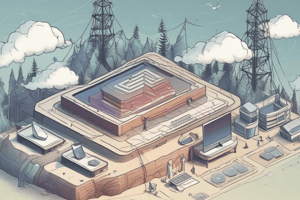Podcast
Questions and Answers
What is the primary purpose of the DataMap screen?
What is the primary purpose of the DataMap screen?
- To eliminate the need for multiple dashboards (correct)
- To create a top-level view for simple systems
- To track entire systems in a detailed format
- To create a detailed view of complex systems
What is the first step in creating a Data Model?
What is the first step in creating a Data Model?
- Creating a new group to define a base data model (correct)
- Selecting a metric from a list
- Customizing the Data Map
- Generating groups automatically
What is the purpose of generating groups in the DataMap screen?
What is the purpose of generating groups in the DataMap screen?
- To customize the Data Map
- To create a detailed view of complex systems
- To select a metric from a list
- To categorize data into groups based on metric labels (correct)
How can the Data Map be customized?
How can the Data Map be customized?
What is the benefit of using the DataMap screen in terms of scalability?
What is the benefit of using the DataMap screen in terms of scalability?
What is the purpose of filtering nodes in the Data Map?
What is the purpose of filtering nodes in the Data Map?
Study Notes
DataMap Screen
- Provides a simple view for large volumes of data, eliminating the need for multiple dashboards
- Enables building a top-level view for complex systems and slicing observability data in new ways
Creating a Data Model
- Begins with creating a new group to define a base data model
- The data model defines the structure of the data map and helps create groups that appear on screen
- Allows selecting a metric from a list, such as a load time metric
Generating Groups
- Selecting 'generate groups' automatically highlights categories from metric labels for visualization
- Coralogix detects and sorts labels attached to metrics, categorizing data into groups
Customizing Data Map
- Enables reordering of groups to change the visualization of data
- Example: reordering by country, then method, then request IP address
- Can add color to the data map based on different metrics, such as load time
- Allows selecting aggregation functions, such as average, and setting threshold values
Visualizing Data
- Provides a high-level view of problem areas in the data and immediate feedback on system changes
- Enables zooming in on a node to investigate low-level data and viewing detailed information for a specific element
- Allows filtering nodes in the map based on fields available on the chosen data model metric, such as viewing only HTTP data for a given country
Scalability
- Data maps can scale to render huge volumes of information in simple, digestible formats
- Makes tracking entire systems more straightforward
Studying That Suits You
Use AI to generate personalized quizzes and flashcards to suit your learning preferences.
Description
Learn how to create a data model, generate groups, customize data maps, and visualize data using Coralogix's DataMap Screen. Understand the features and benefits of this tool for tracking and analyzing large volumes of data.



